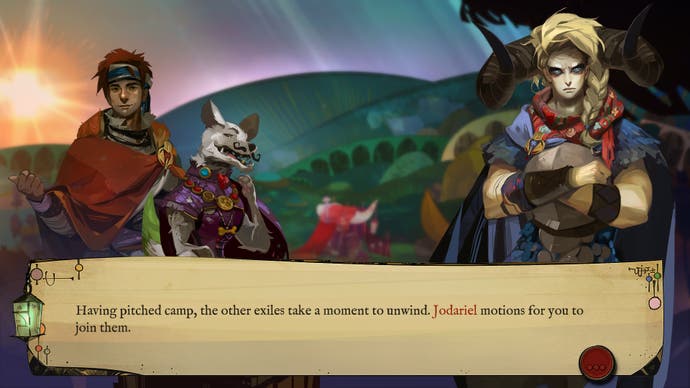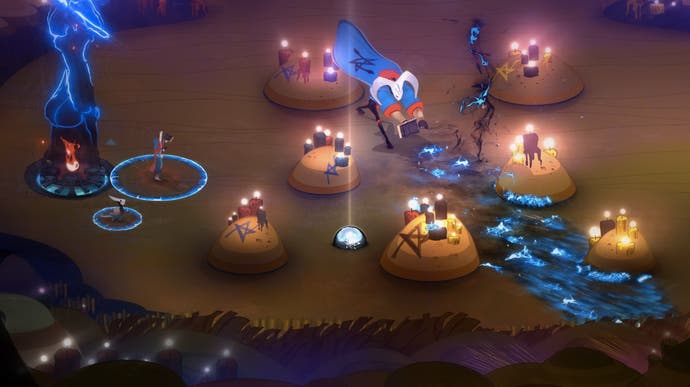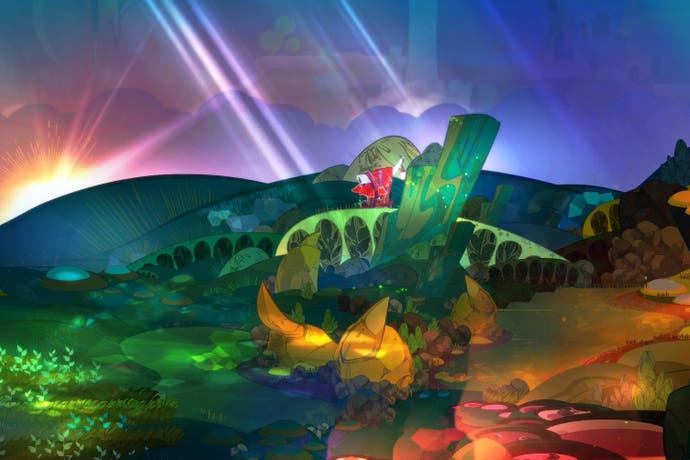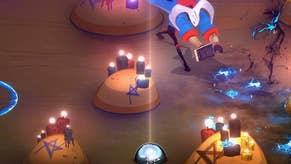Into the Pyre: Taking it higher and higher
The stars my destination.
Bastion and Transistor developer Supergiant has always made games with a lot of character, although they didn't necessarily have a lot of characters. Focused primarily on a sole hero/heroine with a supporting narrator and bit-part antagonist, they kept their narrative structures tight and focused. Supergiant's third outing, Pyre, seems to lose none of its forebears' craft and flavour, but has significantly expanded the scope to allow for an ensemble cast in a branching narrative arc.
As such, Pyre follows a ragtag group of castaways banished to the Downside, a dreary wasteland where all those unfit for the nation of the Commonwealth are sent. You play as a recently exiled sort - a man or woman based on your preference - whose been found by a trio of masked nomads. As it turns out, your character contains the unholy knowledge of literacy and is thus able to understand tomes explaining a way out of the Downside by becoming victorious in a series of rituals that could best be described as "demonic football" (or soccer for my fellow yanks).
These rites encompass the game's combat system. Here's how it works: A group of three characters must bring an orb to their opponent's pyre. You only control one character at a time, but can pass the ball between players. Beyond throwing the orb and switching between roles, your only other abilities are jumping and shooting an "aura" beam at your opponents, making them respawn at their pyre after a few seconds.
It's fast, frenetic and strategic. You won't gain new abilities, but you will be able to enhance what you've already got should you want your characters to dash further, longer, increase their firing range and size, or improve their jumping prowess. Each character has different properties too. The moustachiod dog Rukey can move quickly, but his aura is narrow with little range. Conversely, the brutish demon Jodariel has slow movement, but her aura attacks contain a wide berth and her jump landings stun everyone nearby - allies included.
"The depth of this game is not going to come from enabling more buttons on a controller. We're very interested in mining how much depth there is in these core abilities that these characters have," says Pyre creative director and writer Greg Kasavin in an interview with Eurogamer at PAX. "And as you have more characters and mix and match them in different varieties we think it's going to lead to a great both strategy and different types of action."
"We think that the skill ceiling for the game is quite high," he adds. "We're pretty excited to see the player's ability to play this game in a very expressive fashion - which is something we've always valued in all of our games."

As far as where this idea of sports-based fantasy action RPG came from, Kasavin says it was inspired by the teamwork dynamic of group sports.
"A lot of our early thoughts were around what if we could make a game with an ensemble cast. A lot flowed from that. We were thinking about a game in which a group of characters has to rely on one another, and that being manifested in gameplay and in the narrative and everything. That leant itself to this idea of teamwork."
That explains Pyre's core combat mechanic, but that's only half of the experience. The rest of the game is an interactive fiction adventure combining the road trip dynamics of 80 Days with the character-based branching routes and gameplay buffs of Persona 3 and 4.
As your nomadic group journeys the wasteland you'll have to make various pitstops along the way with choices representing one day of game-time. You're on a tight schedule too as rites can only be performed on certain days in the right locations in accordance with the stars. Most days you can choose between pillaging for resources, studying the Book of Rites for bonuses on how much enlightenment (XP) characters receive after battle, or picking more immediate perks by mentoring a companion. There's plenty of other story-based decisions as you decide who to talk to and what to ask about as your wagon gets into all sorts of text-based scrapes. You won't be able to see everything in one playthrough.
There's also a fuel-system dictating this part of Pyre and players will have to manage resources. When asked if players could run out of gas and face a permanent end, Kasavin explains that earlier builds had that, but it wasn't particularly enjoyable and went against the theme of the game.

"In a good roguelike it's very easy to loop through the game multiple times. You just hit a button and you start over. In this game there's story set up, there's characters you're introduced to- it just began to feel really obnoxious to us to replay that stuff if you didn't want to," he says. "So we are balancing that to where you can suffer temporary setbacks certainly, but in the spirit of the game it's about the journey that you go on and not about turning back from your path. You can find a way to keep going and recover. It's a positive message."
This theme of progression - that you're always growing even if you're failing - will be implemented in the ritual mechanics as well. "We wanted to create a game where the characters have a lot riding on the line, but it wasn't life or death necessarily. If you die in a video game you just hit a button and try again. So for us it was really interesting to support a player who does not always win," he explains.
"If you didn't win, it would go forward anyway. It's not going to game-over you. The characters have to pick themselves up and dust themselves off and talk themselves out of the dumps and keep going because it's about their journey toward enlightenment. And sometimes failure is more enlightening than victory. We all learn a lot through failure as well as through success. That was something that resonated with us personally as an idea."
Beyond its thematic consistency and innovative genre-splicing, Pyre is just plain enjoyable. The PAX East demo I played was only about a half-hour long, but it contained all the lush, otherworldly charm of Supergiant's previous outings with bold colours and dreamlike landscapes working in harmony with an elliptical script. It was hard to get a feel for the Rites system with only the tutorial and first real mission available, but based on my limited time with it this system seems rife with potential. I'm looking forward to coming to grips with Pyre's long-term complexities as it launches next year on PS4 and PC.







.png?width=291&height=164&fit=crop&quality=80&format=jpg&auto=webp)



